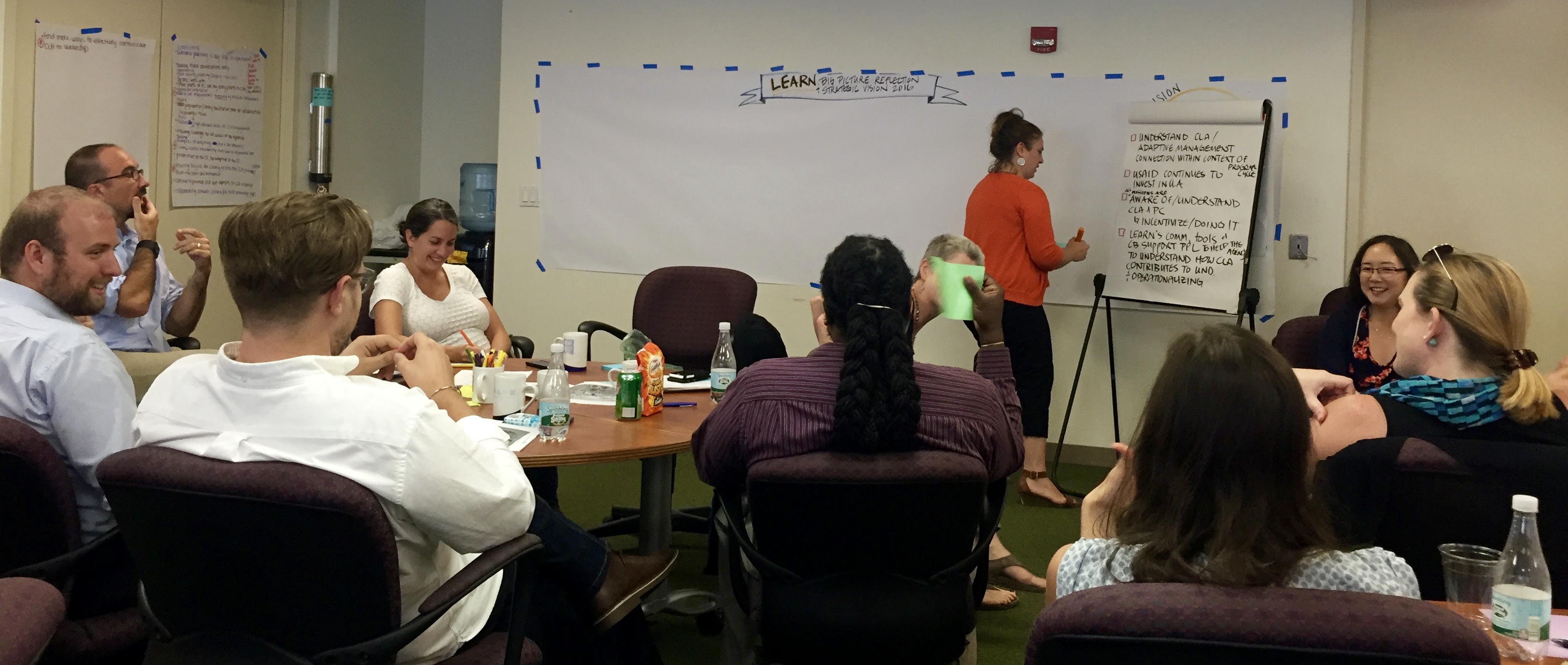Hi! I’m Kristin Lindell and I work on the Monitoring, Evaluation, Research, and Learning (MERL) workstream as a part of USAID’s Learning and Knowledge Management contract (LEARN). LEARN helps USAID and implementing partners integrate systematic and intentional collaborating, learning, and adapting (CLA) into their work to improve development outcomes. In service to supporting USAID and implementing partners, one of our core values on LEARN is “walking the talk” of CLA. We collaborate with key partners to avoid duplication of efforts; we take time to pause and reflect; and we learn from our work to make adjustments informed by data.
One way we “walk the talk” is through our MERL cycle, which supports our adaptive management work. Every quarter, my team aggregates key performance indicators from each of LEARN’s five work streams and hosts a participatory, two-hour discussion reflecting on several key questions: 1) what do these data mean? 2) what should we keep doing that’s going well? 3) what should we stop doing? 4) what should we change? We capture notes from these sessions to share back with the team. These documented conversations then feed into our semi-annual work plans and Performance Monitoring Report. Ultimately, this system helps us understand our progress to date and informs our future work.

Hot Tips:
- When designing a MERL cycle that facilitates adaptive management, start by asking your stakeholders: What do you want to learn? How will this inform your decision-making processes? When we began this process on LEARN, we had to strike a balance between collecting a sufficient amount of data and actually being able to make decisions with the data. We believe that a focus on learning and decision-making rather than accountability alone helps teams prioritize certain indicators over others.
- Reflection and learning moments that feed into existing planning and reporting cycles can lead to program adaptations. On LEARN, our reflections on our data influence our six month work plans and management reports. For example, my team recently decided to discontinue a study we had been planning because survey and focus group data showed the study would not yield results that would be convincing to our target audience.
- If you’re struggling with adaptive management more broadly, consider your organization’s culture. Beyond “walking the talk,” LEARN’s other core values include openness, agility, and creativity. These principles encourage team members to challenge assumptions, be adaptive, and take risks, which all help to cultivate an enabling environment for adaptive management. Ask yourself: does the culture of my organization lend itself to adaptive management? If not, what can I do to change that?
Rad Resources:
- Want to see what LEARN’s MERL plan looks like? Check it out on USAID Learning Lab.
- Want to know more about adaptive management and evaluation? Better Evaluation recently pulled together resources about the connections between the two.
The American Evaluation Association is celebrating International and Cross-Cultural (ICCE) TIG Week with our colleagues in the International and Cross-Cultural Topical Interest Group. The contributions all this week to aea365 come from our ICCE TIG members. Do you have questions, concerns, kudos, or content to extend this aea365 contribution? Please add them in the comments section for this post on the aea365 webpage so that we may enrich our community of practice. Would you like to submit an aea365 Tip? Please send a note of interest to aea365@eval.org. aea365 is sponsored by the American Evaluation Association and provides a Tip-a-Day by and for evaluators.
